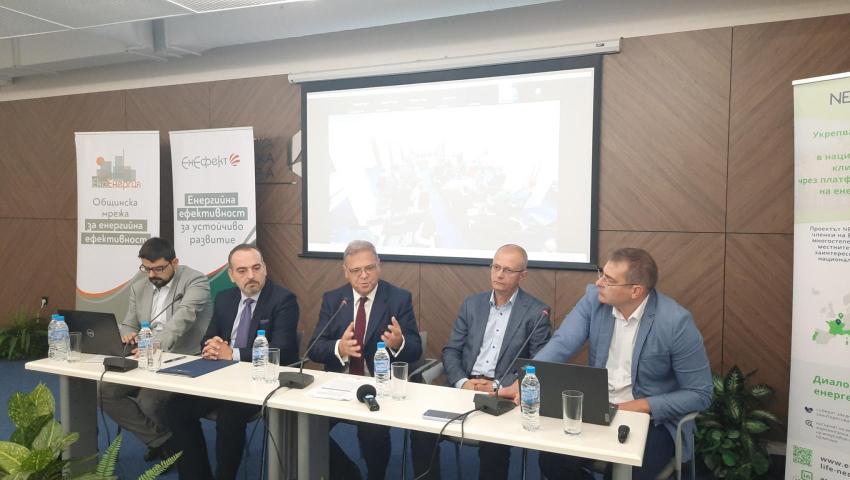The role of energy efficiency is underestimated as a factor for better energy balance and clean transition
The financial sector is making green development a top priority, a national roundtable on energy efficiency investment has revealed

On October 5, a national round table from the series "Investments in Sustainable Energy" took place at the BIA SKY Office Building in Sofia on the topic "After the National Plan for Recovery and Sustainability: Strategic Vision and Practical Dimensions at the Local Level". The organizers of the one-day event were the Bulgarian Chamber of Commerce - Union of Bulgarian Business, the Center for Energy Efficiency "EnEfect" and the Municipal Network for Energy Efficiency "EcoEnergy".
"The concept of today's event is to see what the vision is for the development of horizontal policies for energy efficiency, and then find their sectoral implications and get to the individual instruments," explained Dragomir Tsanev, executive director of the Center for Energy Efficiency "EnEfect".
The event was attended by Julian Popov, Minister of Environment and Water; Angelina Boneva, Deputy Minister of Regional Development and Public Works; Ivaylo Alexiev, executive director of the Agency for Sustainable Energy Development; Dobri Mitrev, Chairman of the Board of the Bulgarian Chamber of Commerce and others.
Asked about the state of the administrative capacity to implement the reforms related to the clean transition, Minister Julian Popov pointed out: "Each municipality, each ministry has its own capacity. The problem is not so much in the capacity in principle, the problem is in the political will and determination and in the observance of political direction. When we all work together and in the same direction, then this administrative capacity can give very good results, especially if it works together with business and with the support of business. of the order of 20-25% of the total cost of energy renovation of buildings, with some owners able to renovate their buildings entirely with their own funding and others to be supported through energy poverty lines - once the whole energy poverty system is operational real.
Deputy Minister Angelina Boneva focused on the development of programs for the renovation of the building stock, saying that there is still not a single application submitted in the second stage of the program for the renovation of multi-family residential buildings, which requires 20% co-financing from the owners. In order to overcome this problem, MRDPW is working on two options to ensure the participation of the owners - with the application of an ESCO contract with the participation of municipalities and with a guarantee scheme for loans from commercial banks, developed by public financial institutions - Fund of Funds and BBR. Work is also underway on the "One Stop Service" reform, and currently the regional information centers will be open to citizens' questions and will cooperate with private organizations that are interested in participating in the process.
Key to the talks was the session with the participation of the Fund of Funds and the BDB, which confirmed the availability of instruments for blended financing of energy efficiency projects, including a grant component and preferential credits for investors. The new guarantee scheme of BBR related to the implementation of the program under NPVU for individual photovoltaic installations was also presented. The two commercial banks that took part in the discussion - UBB and FIB - confirmed their interest in such type of scheme, while presenting numerous specialized products and confirming that green development is the number one priority for the banking sector - both due to the requirements of the taxonomy regulation and and due to increased market demand.
During the national round table, representatives of local authorities, branch organizations, financial institutions, associations and associations in the field of sustainable energy joined the discussion by presenting specific tools and solutions supporting the implementation of public policies. The role of Bulgarian business as a driver of the implementation of climate and energy policies and as a key partner of local authorities was also highlighted, but, according to Dobri Mitrev, there is still a need to remove administrative barriers, and an increasingly serious there is a need for qualified specialists and workers, without whom the real energy transition is unthinkable.
